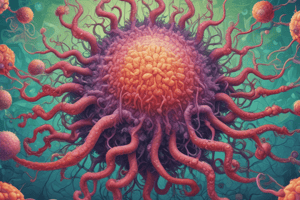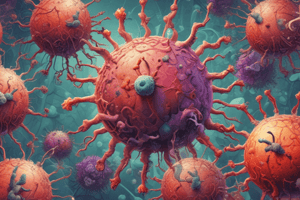Podcast
Questions and Answers
Which of the following are considered characteristics of viruses? (Select all that apply)
Which of the following are considered characteristics of viruses? (Select all that apply)
- Viruses can reproduce on their own
- Viruses are obligate intracellular parasites (correct)
- Viruses lack protein synthesis machinery (correct)
- Viruses are very small (10-400nm) (correct)
What is viral pathogenesis?
What is viral pathogenesis?
The process by which viruses cause disease.
What are the main stages of the virus life cycle in an individual cell?
What are the main stages of the virus life cycle in an individual cell?
Entry, genome replication, gene expression, assembly, and release.
What is the main reason Koch's postulates do not work for viruses?
What is the main reason Koch's postulates do not work for viruses?
Koch’s postulates are modified for _____.
Koch’s postulates are modified for _____.
Which modified Koch’s postulate states that a nucleic acid sequence belonging to a putative pathogen should be present in most cases of an infectious disease?
Which modified Koch’s postulate states that a nucleic acid sequence belonging to a putative pathogen should be present in most cases of an infectious disease?
Flashcards are hidden until you start studying
Study Notes
Virology MIC252: Viral Pathogenesis
-
Course Focus: Viral entry into the human body, spread to other organs, and disease causation. The virus life cycle within a cell (entry, genome replication, gene expression, assembly, and release) is also covered. Cancer-causing viruses are discussed.
-
Required Textbook: Essential Human Virology by J. Louten (2016), available free via the UWC library.
-
Lecture 26: Viral Pathogenesis: Explains how viruses cause disease, enter the human body, spread within the body, transmission modes, and modified Koch's postulates for viruses.
Viruses: Quick Refresher
- Viruses are tiny (10-400 nm), infectious, obligate intracellular parasites.
- They consist of genetic material (RNA or DNA) encased in a protein capsid, sometimes with a membrane.
- Viruses lack protein synthesis; they are neither cells nor bacteria.
Koch's Postulates (and their limitations for viruses)
- Traditional Koch's postulates establish a causal link between a microbe and a disease through four criteria.
- These postulates are unsuitable for viruses because:
- Not all infected individuals show symptoms (e.g., polio).
- Different viruses can cause similar diseases.
- Many viruses are uncultivable in vitro.
- Suitable animal models mimicking human disease may be lacking.
Modified Koch's Postulates (21st Century)
- Focus on identifying pathogen-associated nucleic acid sequences in diseased hosts, their absence (or lower numbers) in healthy hosts, and changes in copy numbers correlating with disease progression or resolution.
Viral Pathogenesis and Viral Disease
- Viral Pathogenesis: The process by which viruses cause disease.
- Viral Disease: The combined effects of viral replication and the host's immune response; influenced by both viral and host genes.
- Many viral infections are asymptomatic or subclinical due to effective host immune control.
- Some viruses evade immune responses, leading to severe disease. Sometimes, the immune response itself is responsible for disease symptoms.
Cycle of Virus Infection
- The provided text states that the cycle of virus infection begins with entry. Further details about the cycle are provided in Lectures 27-31.
Studying That Suits You
Use AI to generate personalized quizzes and flashcards to suit your learning preferences.




